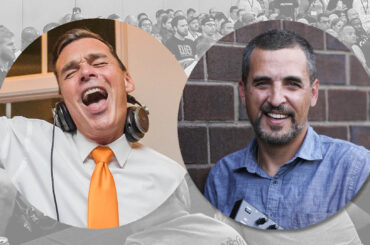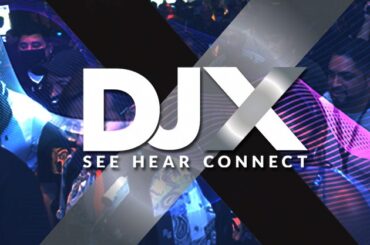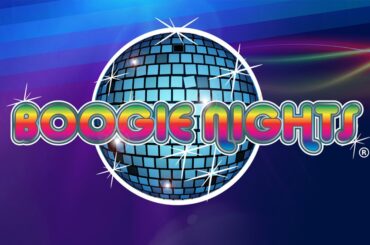Allentown, Pa.—Adam Skuba is that rare fellow who went to college for TV-and-radio production only to find it completely and utterly unfulfilling. Then again, he had been DJing at weddings and Sweet 16 parties since he was 15.
“TV-and-radio production were pretty boring, compared to being able to entertain 100 or so people every night,” he says. “I quickly decided that I would make DJing my full-time livelihood.”
He had that first taste in 2000, at 15, when many of the kids at his school were having Sweet 16 parties. “I thought it would be a pretty neat way to make some money,” he says. “One of the girls’ moms owned a banquet hall and needed an affordable DJ to refer for weddings. Never having done one, I wasn’t sure how things went, so she gave me a crash course on wedding protocol.”
Skuba says it was off to the races. He DJed all through high school, even at his principal’s daughter’s wedding. Once he made the choice to make it his living, he began to read magazines, booking gigs here and there, building relationships with other vendors and getting more referrals from banquet halls.
It wasn’t until he started attending DJ Expo in Atlantic City, however, that he knew there was an event that could help him get better at his job. Says Skuba, “I think the overall experience of seeing so many different DJs in the room at the same time was pretty eye-opening – especially companies of all different skills sets and sizes.”
By going to all of the seminars, buying instructional DVDs from exhibitors, and reaching out to the presenters on a one-to-one basis, Skuba got the education he had been looking for since he first incorporated his business (Skuba Entertainment) in 2002. “I needed to take my business from a part-time hobby with good pay to something substantial,” he says, crediting veteran DJs Mark Brenneisen, Jimmie Malone, and Sean “Big Daddy” McKee for playing roles in his development and ability to grow his business.
“Before I started networking and going to seminars, I didn’t know anything about uplighting or photobooths,” he recalls. “I knew nothing about doing personalized introductions for weddings. It was always the same thing that I picked up watching someone else locally. Having never worked for another company, the only training I had was what I saw other DJs do, speaking through the door of the next banquet room over.”
Skuba says that DJ Expo helped him handle his larger issues. “My two biggest challenges were getting out of my small-town mentality,” he says. “I was stuck, thinking I could never grow beyond the town of 40,000 people I grew up in. The second challenge was finding additional sources of revenue to complement the DJ services, to make more money per event.”
By networking and attending the Expo, he saw first-hand what other DJs were doing across the country. He adapted that experience into his performance. He also added a photobooth and uplighting. “That,” he says, “gave me an edge over my local competition, who was still doing the same routine they started in the ’90s.”
Skuba also learned how to keep guests on the dancefloor. “I mostly do weddings and find that when the couple is out on the floor and the music is right, people will dance,” he says. “I also don’t typically play out full versions of songs, especially if they have long instrumentals.”
Skuba says it’s important to find a mentor – his was Alan Berg. “I think he is one of the best presenters in the wedding industry,” he says. “He has a way of making you feel as if he is talking to you personally when there could be hundreds in the room. Plus, his stories really put things in perspective. The way he explained follow-up and communication with clients, you know, it’s just not rhetoric.”
Skuba characterizes his Eastern Pennsylvania market as competitive, inhabited by a lot of smaller DJ companies. “It’s not like the bigger ones you would find in New York and New Jersey,” he says, “so there are a lot of part-timers and friends of the families. I think my biggest strength is my attention to detail and being able to guide my clients in the right direction by offering suggestions on different ways of doing things and offering suggestions for other great vendors that will allow them to have an all-around great experience. I also network with a lot of vendors and other companies. So If I am booked I refer a lot of work out.”
He also scores gigs with Facebook, where he receives a lot of messages from friends of clients looking for information for their weddings. “I also love [social media] because I can reach out and network with other wedding pros,” he says, “and it’s great to get to know people you haven’t had the opportunity to work with yet.”
On the gear front, Skuba employs a variety of brands. For DJ playback, he uses Virtual DJ software with a Pioneer DJ DDJ-SX2 4-channel controller. For PA purposes, he plays through a combo of RCF active loudspeakers, including 735-A 15-inch speakers, 710-A 10-inch speakers and a 4PRO 8003-AS 18-inch subwoofer. He uses Pioneer DJ SE-DJ5000 headphones and an Audix wireless microphone system, which includes an AP62 receiver and VX5 handheld mics. For lighting applications, he uses Global Truss units, plus Eternal Lighting uplights and Chauvet DJ Intimidator Spot LED 350 moving-head units.
When we ask Skuba if DJing is a full-time pursuit for him, he said he’s never had any other job. “When I first started DJing, I never thought I would be able to make a living doing what I loved,” he says. “Then, when I started to get busier, I never thought I’d be able to support a family on doing what I loved. What I know now is that you can do anything you want to do in life by learning and surrounding yourself with successful people who already do what you want to do. That is why I continue to network and go to seminars and workshops. You can never stop learning.”








